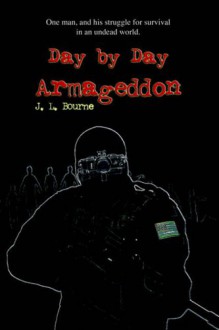
This poor novel had the bad sense to be published in August, this year of our Lord 2017, though, presumably, it was written earlier. EVEN SO, at the very moment of publication, it was already woefully historically anachronistic. I'm going to blame this, like so much else, on the Trump administration, and the unbelievable chaos and unprecedented violation of governmental, social, and ethical norms that we've seen in this fine country, the US of A, since then. Writing near future science fiction is an unbelievable bitch.
This is what got me. So, This is the Way it Ends is avowedly a love letter and a riff on Max Brooks' World War Z, which is also glossed with the subtitle An Oral History of the Zombie Wars. The writer here, Keith Taylor, notes in his introduction how taken he was by the retrospective and documentary feel of World War Z, and how, after expecting a raft of novelists to take up the style, he decided to fill the gap when no one did. This is the Way it Ends is successful in this Brooksian ventriloquism for the most part, and it you like this sort of thing, then this is the sort of thing you'll like. (Well, other than a metatextual spin wherein Keith Taylor, current novelist, inserts himself inside this fictional narrative as "Keith Taylor," the documentarian for the novel. His intro dragging on fictional zombie narratives was way too clever-clever. It's the kind of thing that's fun to read to your wife after you write it, but shouldn't make it into the final draft.)
Like Brooks' novel, this one takes place a dozen odd years after the initial zombie outbreaks, after humanity has gone through the meat grinder of a full on zombie apocalypse and come out on the other side, shaky, diminished, but still standing. This is the section that got me: a centrist Republican, one who shepherded the US through the zombie wars, tells a story from mid-2019. Apparently, there are outbreaks happening all over Europe, and there's more and more worry about the zombie threat. At a bipartisan meeting, a reporter asks if maybe the US should close its borders. A democrat steps up, and in an act of partisan showboating, begins reciting the Emma Lazarus sonnet that is carved into the statue of liberty. "Give us your tired" etc. At this point everyone goes nuts, freaking that closing the borders is evil, and certainly no sane (or not evil) person would suggest such a thing. The Republican president is rueful: if only those stupid liberals knew better.
So here's the problem with this. First, let me tell a joke: at an intersection with four corners, on each corner stands an individual: Santa Claus, the Easter Bunny, a centrist Republican, and an alt-right nutjob. Someone drops a case of money into the center of the intersection. Which individual gets it? The alt-right nutjob, because the rest of these beings are purely fictional. Second, Trump already tried, and has been moderately successful, in implementing his Muslim ban, just recently adding to the seven Muslim-majority countries he's put on the shit list. Though the courts have put on the brakes a little, public outcry was nowhere near uniform. In fact, I think I was in a minority for thinking that was self-defeating and cruel, in addition to racist. The Trump administration is working hard at curtailing literally all immigration, legal and illegal, and we don't have anything near a zombie fucking outbreak to point at, though you wouldn't know it from some Brietbart articles, boy howdy. No one reads sonnets anymore; those are for effete liberals and they are decidedly not in charge. Third, what is this word, "bipartisan"? I do not understand this strange concept.
In some ways, this anachronism is adorable, and it dovetails into some blindspots Brooks had in WWZ. The farther Brooks gets from his worldview, the less compelling his narratives get -- the American housewife one is a big fucking mess, but then I have a whole thing about the housewife in fiction. Ditto with Taylor. As a native Brit with a Mongolian wife who spends a lot of time in Mongolia and Thailand, his grasp on pan-Asian politics is pretty great. Americans? Yeah, not so much. I'm not picking on him here though. I'm not sure I understood (even as someone who purported to at least a modicum of wokeness) how unbelievably racist and isolationist the United States is until the last election. And that election technically didn't involve zombies!
Except it totally did and we're all going to die. The horror of reading horror fiction for me these days is in how unscary it all is. It's nowhere near as terrifying as considering a malignant narcissist who considers Nazis "fine people" starting World War 3, the one that will kill us all, while tweeting on the shitter one Sunday morning. In the words of Mira Grant, rise up while you can.

 Log in with Facebook
Log in with Facebook 






